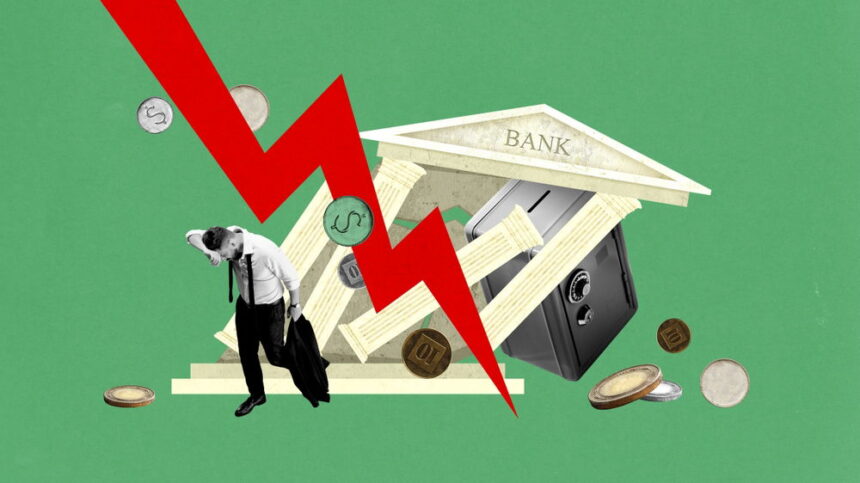Thousands of Americans see savings vanish in ‘Synapse fintech disaster’: Court documents suggest up to 10 million customers could be affected.
Credit: Shutterstock, Werner Spremberg
Court documents suggested up to 10 million customers could have been affected by the ‘Synapse fintech disaster’.
Thousands of American families are still in limbo after fintech middleman Synapse went belly-up, with people’s life savings vanishing overnight and regulators failing to protect customers. Court documents suggested up to 10 million customers could be affected.
Texas mother’s $282,000 life savings gone – the bank offered her $500 compensation.
Thousands of innocent unsuspecting American families are now staring at empty accounts, after fintech firm Synapse, once thought to be the safe middleman, went belly-up, locking away millions in savings.
For many, these funds were meant to be as secure as any savings account could be, but instead, they find themselves in a financial black hole. One customer, Kayla Morris from Texas, has been left devastated after her family’s $282,000 life savings disappeared; she was offered $500 compensation by the bank.
“I can’t believe it,” she said, her voice breaking in court. “I’ve worked my whole life for this money, and now it’s gone. What do I do now?”
Kayla is just one of many affected by the collapse, which has left people questioning the entire banking system. Synapse, which was supposed to help fintech startups like Yotta and Juno offer services like checking accounts and debit cards, became the silent partner between customers and their banks. When Synapse went under, so did the access to their customers’ money. And nobody did anything about it.
Funds locked and lost – Customers left ‘in tears’.
At the heart of the chaos is a missing $96 million of customer funds that still hasn’t been accounted for. While Evolve Bank & Trust has been trying to return funds to customers, the returns have been a far cry from what was promised. At Yotta alone, 13,725 customers say they are owed a total of $64.9 million, but so far, only a pitiful $11.8 million is being offered in compensation, that’s approximately 18.18%, or in other words, for every $100 US customers handed over to the bank, the bank is offering to return $18.18.
Zach Jacobs, 37, of Tampa, Florida, joined the growing wave of outraged customers after logging onto his Evolve account in early November, only to discover his nearly $95,000 was reduced to a shocking $128.68. Describing the whole ordeal as “a reverse bank robbery,” Zach is now leading a group of fellow victims who are banding together to demand action.
“We were promised FDIC protection. We were told our money was safe, and now it’s gone,” said Jacobs. “This isn’t just a mistake – this is theft.”
Promised security, lost savings.
Many customers, like Morris, believed their funds were safely secured by the U.S. government through FDIC insurance. Synapse’s contracts even stated that customer deposits would be protected up to $250,000. But as the dust settled, it became clear that these assurances were worth little more than the paper they were printed on.
Some affected clients have been lucky enough to receive some of their money back, but others, like Andrew Meloan, a chemical engineer from Chicago, have seen their hopes dashed. Andrew’s $200,000 deposit also vanished, and in exchange, Evolve sent him a $5 PayPal payment.
“I’ve been conned,” Andrew said. “They took our money, and now they’re acting like it never existed.”
Crisis deepens – No action from regulators.
The situation has only been worsened by the utter lack of action from U.S. regulators. While fintechs like Yotta, which offered the services, and banks like Evolve, which were supposed to hold the funds, continue to point fingers, customers are being left to pick up the pieces. The FDIC, which traditionally backs savings, made it clear that it wouldn’t cover the losses of nonbanks like Synapse, leaving victims with little recourse.
Jelena McWilliams, the bankruptcy trustee and chairman of the Federal Deposit Insurance Corporation, revealed that the banks involved had failed to cooperate in efforts to reconcile the missing funds. Worse still, regulators have refused to intervene, leaving Americans feeling abandoned.
“We are responsible,” said a Fed spokesperson, claiming that it was the job of Evolve to sort out the mess, but for many victims, this has meant months of waiting with little to show for it.
The real cost of fintech’s Wild West
For many, the shocking loss of funds highlights the dangers of trusting a system where the customer’s relationship with the bank is mediated by fintech middlemen. The fallout from this collapse has sparked outrage among customers who feel betrayed by both the companies involved and the regulators who failed to protect them.
Zach Jacobs isn’t stopping at just complaining. His group, Fight For Our Funds, is gaining traction, with over 3,000 members who are demanding answers.
An uncertain future for fintech
As of now, over 85% of the overall funds held by the banks have been returned to customers, but for the unlucky few like Jacobs, Morris, and Craft, there’s no sign of a happy ending in sight. And with regulators and banks bickering over blame, the people who trusted the system are the ones who are paying the price.
Will they ever get their money back? At the moment, it’s anyone’s guess. But with every passing day, more and more customers are realising that the system isn’t as secure as they thought – and that they’ve become the latest victims in a looming financial crisis.
Will this happen in Europe?
In the wake of the ‘Synapse disaster‘ in the U.S., many are asking: could Europe face a similar catastrophe? With fintechs increasingly partnering with licensed banks, the risk of funds disappearing isn’t as far-fetched as it seems. While the EU has tighter regulations, including the Digital Operational Resilience Act and FCA oversight, these safeguards aren’t foolproof. The rise of banking-as-a-service (BaaS) models means that consumers could still find themselves locked out of their accounts with little recourse. While regulatory sandboxes aim to spot issues before they spiral, Europe’s fast-paced fintech boom means that the risk is never entirely gone. We know one thing; as these companies grow, so too does the need for iron-clad protection to stop customers being left high and dry.
Find more US news.
Find more news in English from around Europe.










